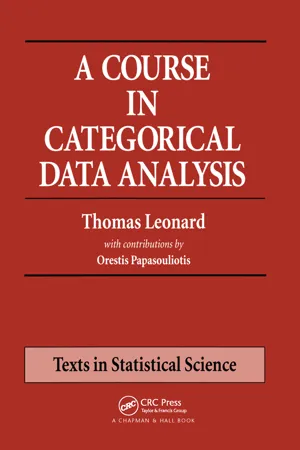
- 204 pages
- English
- ePUB (mobile friendly)
- Available on iOS & Android
eBook - ePub
A Course in Categorical Data Analysis
About this book
Categorical data-comprising counts of individuals, objects, or entities in different categories-emerge frequently from many areas of study, including medicine, sociology, geology, and education. They provide important statistical information that can lead to real-life conclusions and the discovery of fresh knowledge. Therefore, the ability to manipulate, understand, and interpret categorical data becomes of interest-if not essential-to professionals and students in a broad range of disciplines.
Although t-tests, linear regression, and analysis of variance are useful, valid methods for analysis of measurement data, categorical data requires a different methodology and techniques typically not encountered in introductory statistics courses. Developed from long experience in teaching categorical analysis to a multidisciplinary mix of undergraduate and graduate students, A Course in Categorical Data Analysis presents the easiest, most straightforward ways of extracting real-life conclusions from contingency tables. The author uses a Fisherian approach to categorical data analysis and incorporates numerous examples and real data sets. Although he offers S-PLUS routines through the Internet, readers do not need full knowledge of a statistical software package.
In this unique text, the author chooses methods and an approach that nurtures intuitive thinking. He trains his readers to focus not on finding a model that fits the data, but on using different models that may lead to meaningful conclusions. The book offers some simple, innovative techniques not highighted in other texts that help make the book accessible to a broad, interdisciplinary audience. A Course in Categorical Data Analysis enables readers to quickly use its offering of tools for drawing scientific, medical, or real-life conclusions from categorical data sets.
Tools to learn more effectively

Saving Books

Keyword Search

Annotating Text

Listen to it instead
Information
Table of contents
- Cover
- Half Title
- Title Page
- Copyright Page
- Dedication
- Table of Contents
- Preface
- Special Software
- 1 Sampling Distributions
- 2 Two-by-Two Contingency Tables
- 3 Simpson’s Paradox and 23 Tables
- 4 The Madison Drug and Alcohol Abuse Study
- 5 Goodman’s Full-Rank Interaction Analysis
- 6 Further Examples and Extensions
- 7 Conditional Independence Models for Two-Way Tables
- 8 Logistic Regression
- 9 Further Regression Models
- 10 Final Topics
- References
- Index
Frequently asked questions
Yes, you can cancel anytime from the Subscription tab in your account settings on the Perlego website. Your subscription will stay active until the end of your current billing period. Learn how to cancel your subscription
No, books cannot be downloaded as external files, such as PDFs, for use outside of Perlego. However, you can download books within the Perlego app for offline reading on mobile or tablet. Learn how to download books offline
Perlego offers two plans: Essential and Complete
- Essential is ideal for learners and professionals who enjoy exploring a wide range of subjects. Access the Essential Library with 800,000+ trusted titles and best-sellers across business, personal growth, and the humanities. Includes unlimited reading time and Standard Read Aloud voice.
- Complete: Perfect for advanced learners and researchers needing full, unrestricted access. Unlock 1.4M+ books across hundreds of subjects, including academic and specialized titles. The Complete Plan also includes advanced features like Premium Read Aloud and Research Assistant.
We are an online textbook subscription service, where you can get access to an entire online library for less than the price of a single book per month. With over 1 million books across 990+ topics, we’ve got you covered! Learn about our mission
Look out for the read-aloud symbol on your next book to see if you can listen to it. The read-aloud tool reads text aloud for you, highlighting the text as it is being read. You can pause it, speed it up and slow it down. Learn more about Read Aloud
Yes! You can use the Perlego app on both iOS and Android devices to read anytime, anywhere — even offline. Perfect for commutes or when you’re on the go.
Please note we cannot support devices running on iOS 13 and Android 7 or earlier. Learn more about using the app
Please note we cannot support devices running on iOS 13 and Android 7 or earlier. Learn more about using the app
Yes, you can access A Course in Categorical Data Analysis by Thomas Leonard in PDF and/or ePUB format, as well as other popular books in Mathematics & Probability & Statistics. We have over one million books available in our catalogue for you to explore.